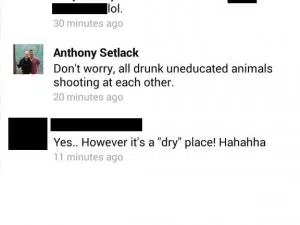
RCMP investigating officer after derogatory comments about First Nation
A derogatory online comment about people in a northern Saskatchewan First Nation community has led the RCMP to look into one of its own officers.
On Monday, an article was shared on a Facebook page about an incident at the Sucker River Reserve. The comment, allegedly posted by Cst. Anthony Setlack, said “all drunk uneducated animals shooting at each other.”
RCMP spokesperson Craig Cleary said they are looking into the comment.
“We do have policy governing conduct and the use of social networking. The RCMP itself is held to a higher standard by the public that we serve and the use of the Internet for social networking and social media applications must align with those same standards,” Cleary explained.


